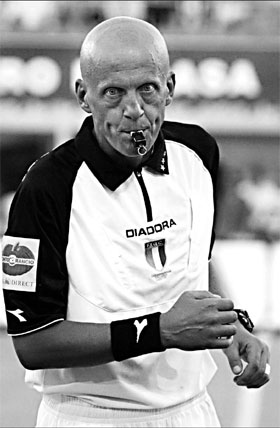Collina: Man in middle needs respect
ZURICH: Pierluigi Collina's steely gaze tells its own story. He is about to let rip and suddenly it's easy to see why David Beckham once admitted the Italian was the only referee who scared him.
Collina's instantly recognizable features are creased into a frown because he is contemplating the increasingly intolerable pressure put on the officials who take charge of football's biggest matches.
The 47-year-old was regarded as the best referee in the world during his 14-year career and, although he has been retired for two years now, he retains a burning enthusiasm for the sport and his profession's role in it.
|
Italian referee Pierluigi Collina whistles during a game between Bologna and Parma on June 18, 2005 in Bologna. The 47-year-old was regarded as the best referee in the world during his 14-year career. AFP |
He knows football can captivate millions around the globe, but he is also only too aware that the huge rewards on offer at the highest level have placed officials in an unenviable position.
Players and managers are ready to use referees as a convenient fall guy when they fail and television is only too keen to put them under the microscope for the sake of a talking point.
Collina, speaking as he was unveiled as Mastercard's new Football Ambassador, believes the answer is simply a matter of respect.
The habit of intimidating referees by surrounding them like a pack of baying dogs when contesting a decision is a recurring problem, especially in the English Premier League.
Collina insists players are disrespecting the game when they lose control in that manner and wants them to think before they start complaining.
"Football needs respect from every angle. We can speak about different situations where respect is needed and certainly this is one," he told AFP.
"We need respect between players and referees on the field, and between managers and players as well.
"Every player has to do everything in their capacity to make a better atmosphere. They must be calm. At Euro 2008 and in the Champions League we have the perfect opportunity to set a better example."
Television's all-pervasive influence will only increase while satellite companies pump vast sums of money into football. In return for the cash they want to have a bigger say in the game and that leaves the referee in their spotlight as multiple camera angle pick holes in every decision.
It is not a development that sits easily with Collina, who believes the referee must be allowed to do his job without becoming a hate figure.
"I would say even from the time I started refereeing in the Italian first division in 1991 and in the Champions League in 1995, there is a big difference," he said.
"Nowadays television cameras show you things differently from 10 or 15 years ago. You have to be aware that everything you did is not enough because you are scrutinized by 24 cameras.
"There are many chances to offer something to the viewer differently to how players, coaches, or even the spectators in the stadium saw it live.
"Sometimes you finish the match thinking everything is ok, but at home people are watching a totally different thing.
"It is so easy using 24 cameras to find something different to the referee's view. It is very unfair to be assessed thanks to the cameras.
"We should consider everything before we say referees have not performed well enough."
A referee who makes an honest mistake in a big match puts not only his reputation but also his health at risk.
Swedish official Anders Frisk retired after receiving death threats following Jose Mourinho's outburst against him in the wake of Chelsea's loss at Barcelona in 2005.
Then earlier this year Herbert Fandel was attacked on the pitch by a Denmark supporter angry at his decisions during a Euro 2008 qualifier against Sweden.
Collina, who refereed the 2002 World Cup final and the 1999 Champions League final, believes having unshakable self-belief is the only way to survive as a modern referee.
"The pressure on the referee's shoulders is very big. For example in the Champions League final you might have done a good job for the whole match, but you know that one mistake could be the end," he said.
"You would be remembered not for what you did before but the mistake you made at the end. This is the pressure on you.
"The only thing you can do is be very self-confident. To be sure you did everything in your capacity to be prepared, to be ready so you don't miss one chance."
AFP
(China Daily 12/20/2007 page23)















